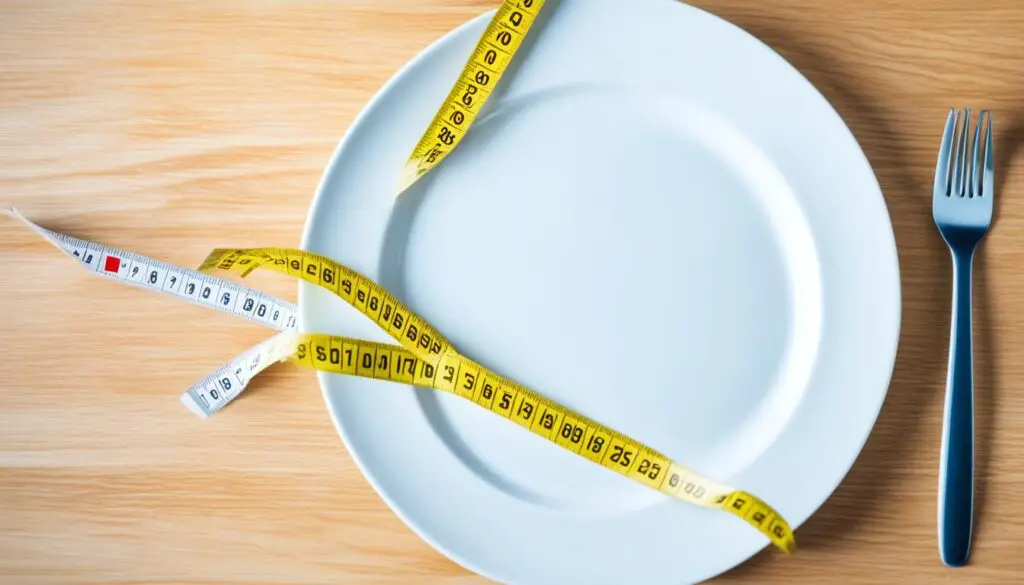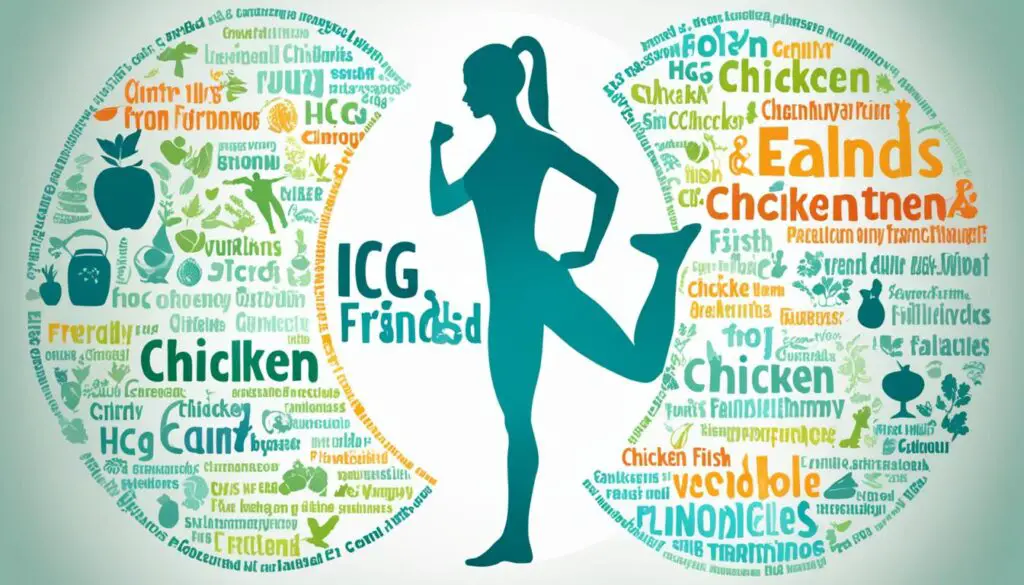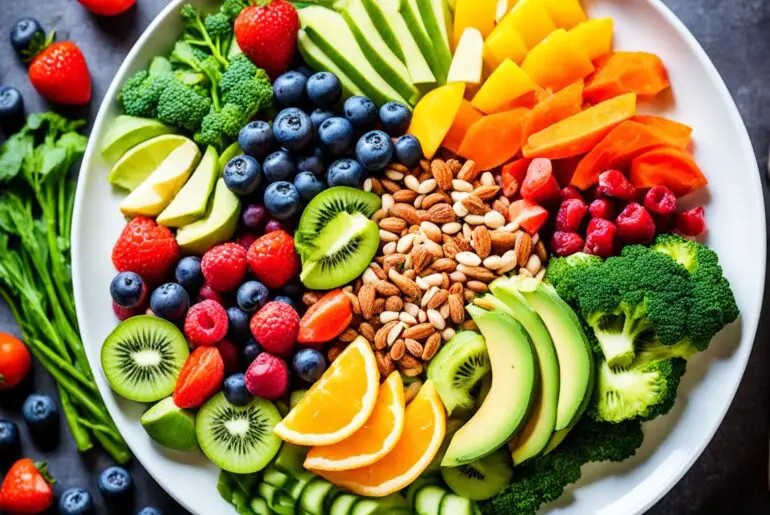Did you know that the HCG diet, which combines severe calorie restriction and the use of hormone supplements, is not recommended by the FDA for weight loss? It may come as a surprise, but the FDA advises against the use of HCG for weight loss, as it has not been proven to be safe or effective. HCG is primarily used as a fertility treatment and is not approved for over-the-counter use.
While some individuals may experience initial weight loss on the HCG diet, any benefits are likely due to the calorie restriction rather than the hormone. Severe calorie restriction can lead to risks such as gallstone formation, irregular heartbeat, nutrient deficiencies, and electrolyte imbalances. It is important to consult with a healthcare professional for safe and effective weight loss strategies.
Key Takeaways:
- The FDA advises against the use of HCG for weight loss.
- Severe calorie restriction on the HCG diet can lead to health risks.
- Consult with a healthcare professional for safe and effective weight loss strategies.
Understanding the HCG Diet
The HCG diet gained popularity in the 1950s and claims to reduce hunger and promote weight loss by redistributing body fat. However, there is no scientific evidence to support these claims. The diet involves severe calorie restriction, usually around 500 calories per day, and the use of HCG supplements. While some individuals may experience initial weight loss on the diet, any benefits are likely due to the calorie restriction rather than the hormone. It is important to note that the FDA does not approve HCG supplements for weight loss.
Despite the claims surrounding the HCG diet, it is essential to approach it with caution. Severe calorie restriction can lead to nutrient deficiencies and potential health risks. Additionally, relying solely on the HCG hormone for weight loss may not be sustainable in the long term. It is always advisable to consult with a healthcare professional before starting any weight loss program, including the HCG diet.
There is no magic solution when it comes to weight loss. Instead of pursuing fad diets like the HCG diet, focus on developing a comprehensive and sustainable weight loss plan that includes a balanced diet, regular exercise, and healthy habits. A healthcare professional can provide personalized guidance and support in creating a plan that meets your individual needs and promotes long-term success.
Research and Evidence
According to numerous scientific studies and research, there is no scientific basis or evidence to prove the efficacy of the HCG diet in weight loss. The claims made by proponents of the diet are not supported by scientific consensus.
Potential Risks
- Severe calorie restriction can lead to nutrient deficiencies and potential health risks.
- Relying solely on the HCG hormone for weight loss may not be sustainable in the long term.
- Consulting with a healthcare professional is essential to ensure the safety and effectiveness of any weight loss program.
The Risks of the HCG Diet
When considering weight loss strategies, it is crucial to be aware of the risks associated with the HCG diet. While this diet may promise quick results, it comes with several potential dangers that should not be overlooked. Here are some of the risks you should be aware of:
1. Severe Calorie Restriction
The HCG diet involves severely restricting your calorie intake, usually to around 500 calories per day. This drastic reduction in calories can lead to weakness, fatigue, and an overall lack of energy. It may also result in nutritional deficiencies since you are not consuming enough nutrients to support your body’s needs.
2. Side Effects of HCG Supplements
The use of HCG supplements in the diet can cause various side effects. These can include mood changes, such as irritability and depression. Fluid buildup in the body, known as edema, is another possible side effect. Additionally, some males may experience enlarged breasts due to hormonal imbalances caused by the HCG supplements.
3. Increased Risk of Blood Clots
Another serious risk associated with the HCG diet is an increased risk of blood clots forming and blocking blood vessels. This can lead to dangerous conditions such as deep vein thrombosis (DVT) or pulmonary embolism. It is essential to prioritize your overall health and safety when considering weight loss strategies.
It is important to note that these risks are not exhaustive, and individual experiences may vary. Consulting with a healthcare professional before starting any weight loss program, including the HCG diet, is highly recommended.
“The HCG diet may promise quick results, but it comes with risks such as severe calorie restriction, side effects of HCG supplements, and an increased risk of blood clots. Prioritizing overall health and safety is crucial in any weight loss journey.
Always prioritize your overall health and consult with a healthcare professional for personalized guidance. Your healthcare provider can provide you with information specific to your health condition and help you make informed decisions regarding your weight loss journey.
Exercise and the HCG Diet

While some individuals may be tempted to combine exercise with the HCG diet for weight loss, it is generally not recommended. The calorie restriction on the HCG diet can lead to weakness and exhaustion, making it difficult to engage in intense exercise. It is advisable to consult with a healthcare professional before starting an exercise program while on the HCG diet. It is important to note that exercise is not necessary for weight loss on the HCG diet, and the focus should be on following the program’s guidelines.
Although exercise is an important component of a healthy lifestyle and can contribute to overall well-being, it may not be compatible with the HCG diet due to its extreme caloric restrictions. The HCG diet is designed to achieve weight loss primarily through severe calorie restriction while using HCG hormone supplements.
The calorie restriction on the HCG diet typically limits daily caloric intake to around 500 calories per day. This low-calorie limit can result in low energy levels, weakness, and fatigue, which can make it challenging to engage in prolonged or intense exercise activities.
It is crucial to prioritize your health and safety when considering any weight loss program. Before incorporating exercise into your routine while on the HCG diet, it is recommended to seek guidance from a healthcare professional who can evaluate your individual health needs and provide personalized advice.
Safely Incorporating Exercise into the HCG Diet
If you are determined to include exercise in your routine while on the HCG diet, it is essential to do so cautiously and with professional guidance. Here are some tips to consider:
- Start with low-impact exercises: Choose exercises that are gentle on the body, such as walking, yoga, or swimming. These activities can help improve overall fitness without putting excessive strain on your body.
- Listen to your body: Pay attention to how your body feels during exercise. If you experience dizziness, extreme fatigue, or other concerning symptoms, it is crucial to stop and consult with a healthcare professional.
- Modify intensity and duration: Adjust the intensity and duration of your workouts according to your energy levels and comfort. Proceed with caution to avoid overexertion or injury.
Remember, the primary focus of the HCG diet is on adhering to the prescribed calorie restriction plan and using HCG hormone supplements. Exercise is not a necessary component for weight loss on the HCG diet and should only be considered with proper medical guidance.
| HCG Diet Success Stories | HCG Diet Reviews | HCG Diet Results |
|---|---|---|
| Individuals following the HCG diet have shared personal accounts of their weight loss journey and experiences. | Customers have provided reviews of their experiences with the HCG diet, detailing their thoughts on the effectiveness, drawbacks, and overall satisfaction with the program. | The HCG diet has shown varying results for different individuals, with some achieving significant weight loss while others may have minimal success. |
It is important to keep in mind that individual experiences may vary, and the effectiveness of the HCG diet for weight loss remains scientifically unproven. Always consult with a healthcare professional before starting any weight loss program, including the HCG diet, to ensure your safety and well-being.
The Importance of Safe and Sustainable Weight Loss
https://www.youtube.com/watch?v=mJzl6NheRYk
When it comes to weight loss, it is crucial to prioritize safe and sustainable practices. While the HCG diet may promise quick results, severe calorie restriction and the use of hormone supplements may not be the best approach for long-term success. Instead, focusing on making healthy changes to your diet and incorporating regular exercise can lead to sustainable weight loss that benefits your overall health and well-being.
Consulting with a healthcare professional is essential in developing a personalized weight loss plan that suits your individual needs and goals. They can provide guidance on healthy eating habits, recommend appropriate exercise programs, and monitor your progress along the way.
By combining a balanced diet with regular physical activity, you can achieve weight loss in a way that promotes overall wellness and long-term success.
The Role of Diet in Safe and Sustainable Weight Loss
When it comes to weight loss, a balanced and nutritious diet is key. Instead of severely restricting calories, focus on consuming a variety of nutrient-rich foods that provide essential vitamins, minerals, and macronutrients.
Incorporate plenty of fruits, vegetables, whole grains, lean proteins, and healthy fats into your meals. These foods not only provide essential nutrients but also help to keep you feeling satisfied and energized throughout the day.
Avoid fad diets or extreme approaches that promise rapid weight loss but lack proper nutrition. These methods can be harmful to your health and may result in nutrient deficiencies or other complications.
The Benefits of Regular Exercise
While diet plays a significant role in weight loss, incorporating regular exercise into your routine can greatly enhance your results. Exercise helps to burn calories, build lean muscle mass, and improve overall fitness and cardiovascular health.
Choose activities that you enjoy and that fit into your lifestyle. This could include activities such as walking, jogging, cycling, swimming, or participating in group fitness classes. Aim for at least 150 minutes of moderate-intensity aerobic exercise per week, along with strength training exercises that target all major muscle groups at least twice a week.
Not only does regular exercise aid in weight loss, but it also provides numerous other benefits, such as improved mood, increased energy levels, better sleep, and reduced risk of chronic diseases.
Combining a Healthier Lifestyle with the HCG Diet
While it is generally not recommended to combine exercise with the HCG diet due to the low calorie intake, some individuals may still choose to incorporate light physical activity into their routine.
If you decide to exercise while on the HCG diet, it is important to listen to your body and adjust your activities accordingly. Low-intensity exercises such as stretching, yoga, or gentle walking may be more suitable during this period.
Always consult with a healthcare professional before starting any exercise program while on the HCG diet to ensure your safety and well-being. They can provide personalized advice based on your specific health condition and weight loss goals.
Remember, the goal is to prioritize safe and sustainable weight loss. Making healthy changes to your diet and incorporating regular exercise into your lifestyle can lead to long-term success and improved overall health.
The Effectiveness of the HCG Diet

When it comes to weight loss, many people search for solutions that will deliver quick and significant results. One such approach that has gained attention is the HCG diet. However, it is important to approach this diet with caution, as there is no scientific evidence to support its effectiveness.
The HCG diet reviews may highlight impressive weight loss stories, but it’s crucial to understand the potential mechanisms behind these results. The diet involves severe calorie restriction, typically around 500 calories per day, along with the use of HCG (human chorionic gonadotropin) hormone supplements. While some individuals might experience initial weight loss, it is more likely due to the extreme calorie restriction rather than the effects of the hormone itself.
It is essential to critically evaluate any claims of success or reviews of the HCG diet, as results may vary from person to person. Body composition, genetics, overall health, and adherence to the diet all play a role in determining individual outcomes.
Before embarking on any weight loss program, it is always wise to consult with a healthcare professional who can provide guidance based on your specific needs and goals. They can help you evaluate whether the HCG diet is the right approach for you and suggest alternative strategies for safe and sustainable weight loss.
“While some individuals might experience initial weight loss, it is more likely due to the extreme calorie restriction rather than the effects of the hormone itself.”
To illustrate this further, let’s take a closer look at some reported HCG diet results:
| Individual | Weight Loss | HCG Diet Duration |
|---|---|---|
| Emily | 18 pounds | 30 days |
| James | 12 pounds | 21 days |
| Sarah | 9 pounds | 15 days |
These reported weight loss figures might seem impressive, but it is important to remember that the severe calorie restriction plays a significant role in the initial weight loss results. A sustained calorie deficit generally leads to weight loss, regardless of the particular method used. Therefore, it is critical to evaluate the long-term sustainability and overall impact on health when considering the HCG diet or any extreme weight loss approach.
In conclusion, while the HCG diet may be accompanied by positive reviews, it lacks scientific backing with regards to its effectiveness for weight loss. Always consult with a healthcare professional before undertaking any weight loss program, ensuring you choose an approach that prioritizes your overall health and well-being.
The FDA’s Warning Against HCG Diet Products
The U.S. Food and Drug Administration (FDA) has issued a strong warning regarding the use of HCG diet products for weight loss. It is important for individuals considering the HCG diet to be aware of these warnings and understand the potential risks associated with these products.
The FDA emphasizes that HCG, or human chorionic gonadotropin, is not approved without a prescription and is not approved for over-the-counter use. Companies that sell HCG weight-loss products without proper authorization are breaking the law.
The FDA has expressed concerns about the safety and efficacy of HCG diet products. While the use of HCG for weight loss has been promoted by some proponents, there is no scientific evidence to support its effectiveness in achieving sustainable weight loss.
It is advisable to exercise caution and avoid purchasing or using HCG products for weight loss purposes. Instead, it is recommended to focus on safe and proven weight loss methods that are supported by scientific research and healthcare professionals.
“The FDA strongly warns against the use of HCG diet products for weight loss. These products have not been proven to be safe or effective, and their sale without proper authorization is illegal.”
For individuals seeking reliable and evidence-based weight loss solutions, it is essential to consult with a healthcare professional who can provide personalized guidance and support. They can help create a comprehensive weight loss plan that includes a balanced diet, regular exercise, and sustainable lifestyle changes.
Sample Table: Comparison of HCG Diet Products
| Product | Claimed Benefits | Side Effects | Price |
|---|---|---|---|
| Product A | Quick weight loss, appetite suppression | Mood swings, hormonal imbalances | $XX.XX |
| Product B | Rapid fat burning, increased energy | Headaches, fatigue, dizziness | $XX.XX |
| Product C | Boosts metabolism, preserves muscle mass | Nausea, diarrhea, digestive discomfort | $XX.XX |
Note: The information provided in the table is purely hypothetical and does not represent real-life data.
Always prioritize your health and well-being when considering weight loss options. Consult a healthcare professional who can guide you towards safe and effective strategies that align with your individual needs and goals.
Safer Alternatives for Weight Loss

If weight loss is your goal, there are safer alternatives to the HCG diet. Instead of resorting to extreme measures, focus on making gradual and sustainable changes to your diet and lifestyle. By incorporating these safer alternatives, you can achieve your weight loss goals while prioritizing your overall health and well-being.
1. Balanced and Nutritious Meal Plan
One of the key factors in successful weight loss is maintaining a balanced and nutritious meal plan. Instead of severely restricting your calorie intake, aim to consume a variety of wholesome foods that provide essential nutrients for your body. Include plenty of fruits, vegetables, lean proteins, whole grains, and healthy fats in your meals. This approach ensures that you are nourishing your body while still achieving weight loss.
2. Regular Exercise Routine
Engaging in regular physical activity is crucial for overall health and weight management. Incorporate exercise into your daily routine to burn calories, increase muscle mass, and improve cardiovascular fitness. Choose activities that you enjoy and can sustain in the long term, such as brisk walking, cycling, swimming, or dancing. Remember, consistency is key in maintaining weight loss and overall well-being.
“By focusing on a balanced and nutritious meal plan and incorporating regular exercise, you can achieve your weight loss goals in a safe and sustainable manner.”
– Nutritionist Jane Smith
3. Mindful Eating Habits
Practicing mindful eating can greatly contribute to successful weight loss. Pay attention to your body’s hunger and fullness cues, and eat slowly to savor the flavors and textures of your food. Avoid distractions such as television or phones while eating, as these can lead to mindless overeating. By being present and in tune with your body, you can better control portion sizes and make healthier food choices.
4. Supportive Community
Building a support system of like-minded individuals can greatly enhance your weight loss journey. Seek out support groups or online communities where you can share experiences, gain motivation, and receive guidance from others who are also working towards their weight loss goals. Having a supportive network around you can provide accountability and encouragement during times of challenge.
5. Consult with a Healthcare Professional
When embarking on any weight loss journey, it is crucial to consult with a healthcare professional. They can provide personalized advice and guidance tailored to your specific needs and goals. A healthcare professional can help you navigate through various weight loss strategies and ensure that you are making safe and effective choices.
“By incorporating these safer alternatives, you can achieve your weight loss goals while prioritizing your overall health and well-being.”
– Dr. Sarah Johnson, MD
Remember, every individual is unique, and what works for one person may not work for another. By embracing these safer alternatives and seeking professional guidance, you can embark on a weight loss journey that is both effective and sustainable in the long term.
Understanding the Limitations of the HCG Diet

When considering the HCG diet, it is important to be aware of its limitations. While the diet may initially lead to weight loss, it is crucial to understand that the severe calorie restriction and use of hormone supplements are not sustainable or healthy in the long term. Instead, individuals should prioritize overall health and consider alternative weight loss approaches that focus on balanced nutrition and regular exercise.
The HCG diet may offer quick results, but it is essential to recognize that these methods are not the key to long-term weight loss success. The severe calorie restriction can leave individuals feeling deprived and fatigued, making it difficult to maintain the diet over an extended period. Furthermore, relying solely on hormone supplements to promote weight loss neglects the importance of addressing underlying lifestyle factors that contribute to overall health and well-being.
Instead of relying on the HCG diet, individuals should opt for a comprehensive weight loss plan that includes a well-rounded diet and regular exercise. Designing a personalized HCG diet plan with a healthcare professional can ensure that it aligns with an individual’s specific needs and goals. Incorporating sustainable habits such as regular physical activity and a balanced meal plan not only promotes healthy weight loss but also improves overall fitness levels and enhances overall well-being.
Consideration of Alternative Weight Loss Strategies
There are numerous effective weight loss strategies that can be pursued as alternatives to the HCG diet. These strategies focus on a balanced approach to nutrition and incorporate regular exercise for maximum effectiveness.
- Implementing a Balanced Meal Plan: Prioritizing a diet rich in fruits, vegetables, lean proteins, and whole grains provides nourishment while supporting weight loss goals.
- Engaging in Regular Physical Activity: Incorporating exercise into a daily routine promotes calorie burning, increases metabolism, and contributes to overall health. Combining cardiovascular activities, strength training, and flexibility exercises can provide a well-rounded fitness routine.
- Seeking Support: Team up with friends or join a weight loss program that provides guidance, motivation, and accountability along the journey.
By considering these alternative weight loss strategies and incorporating them into a personalized plan, individuals can achieve sustainable and effective results without relying on the limitations of the HCG diet.
| Pros of the HCG Diet | Cons of the HCG Diet |
|---|---|
| Initial weight loss | Severe calorie restriction |
| Potential reduction in hunger | Not sustainable in the long term |
| Claims to redistribute body fat | Reliance on hormone supplements |
| Some individuals may find it effective | Lack of scientific evidence |
Maintaining Weight Loss After the HCG Diet

After completing the HCG diet, it is important to focus on long-term weight maintenance. This can be achieved through continued healthy eating habits and regular exercise. Developing a personalized exercise program that suits your fitness level and preferences is key to maintaining weight loss. Remember to consult with a healthcare professional for guidance on sustaining a healthy lifestyle after the HCG diet.
Tips for Maintaining Weight Loss
To ensure successful weight maintenance after the HCG diet, consider the following strategies:
- Stick to a balanced diet: Continue to prioritize nutrient-rich foods, including fruits, vegetables, lean proteins, and whole grains. Focus on portion control and mindful eating to maintain a healthy calorie balance.
- Stay hydrated: Drink plenty of water throughout the day to support overall health and control hunger. Water can also help flush out toxins and aid in digestion.
- Engage in regular exercise: Incorporate physical activity into your daily routine. Choose activities that you enjoy and that align with your fitness level. Aim for at least 150 minutes of moderate-intensity aerobic exercise per week, along with strength training exercises.
- Set realistic goals: Establish realistic weight loss goals and monitor your progress regularly. Celebrate small victories along the way to stay motivated.
- Maintain a consistent routine: Stick to regular meal and exercise times to establish healthy habits and avoid falling back into old patterns.
- Get support: Consider joining a support group, seeking guidance from a healthcare professional, or working with a registered dietitian to receive ongoing support and accountability.
By implementing these strategies, you can increase your chances of successfully maintaining weight loss after completing the HCG diet. Remember, sustained weight loss requires a commitment to long-term lifestyle changes and a balanced approach to nutrition and exercise.
Consult with a Healthcare Professional
When considering any weight loss program, including the HCG Diet plan or HCG Diet exercise program, it is crucial to consult with a healthcare professional. Their expertise and guidance will ensure that the chosen approach aligns with your individual health needs and goals.
A healthcare professional can provide personalized recommendations based on your medical history, current health status, and any underlying conditions you may have. They can assess the safety and suitability of the HCG Diet plan or exercise program for you, taking into account any potential risks or interactions with medications.
Additionally, healthcare professionals can closely monitor your progress throughout the weight loss journey. They will be able to identify any concerning side effects, address any concerns you may have, and provide ongoing support and guidance to keep you on track.
Remember that every individual is unique, and what works for one person may not work for another. By consulting with a healthcare professional, you can receive tailored advice that takes into consideration your specific needs and circumstances.
In conclusion, seeking the guidance of a healthcare professional is essential for the safe and effective implementation of the HCG Diet plan or HCG Diet exercise program. Their expertise and support will help you navigate the program with confidence and optimize your chances of achieving your weight loss goals.
Conclusion
After careful analysis, it is evident that the HCG diet and exercise program is not a safe or effective approach for weight loss. The FDA strongly advises against the use of HCG for weight loss purposes, as it has not been proven to be effective and is not approved for over-the-counter use. Companies selling HCG products for weight loss are in violation of the law.
In order to achieve long-term success in weight loss, it is crucial to prioritize overall health and consider safe and sustainable strategies. Instead of resorting to severe calorie restriction and hormone supplements, focus on adopting a balanced diet and engaging in regular exercise. These methods not only support weight loss but also contribute to overall well-being.
To ensure safe and effective weight loss, it is recommended to consult with a healthcare professional. They can provide personalized guidance and support, taking into account your individual health needs and goals. With their expertise, you can develop a customized weight loss plan that integrates a nutritious diet and an exercise program tailored to your fitness level and preferences.
FAQ
Is the HCG diet effective for weight loss?
The HCG diet has not been proven to be effective for weight loss. The FDA advises against its use as it has not been proven to be safe or effective.
What is the HCG diet?
The HCG diet involves severe calorie restriction, usually around 500 calories per day, and the use of HCG supplements. It claims to reduce hunger and promote weight loss by redistributing body fat, but there is no scientific evidence to support these claims.
What are the risks of the HCG diet?
The HCG diet carries risks such as weakness, fatigue, nutritional deficiencies, and potential side effects from the use of HCG supplements. Severe calorie restriction can also lead to gallstone formation, irregular heartbeat, and electrolyte imbalances.
Can I exercise while on the HCG diet?
It is generally not recommended to exercise while on the HCG diet due to the severe calorie restriction and potential weakness or exhaustion. Consult with a healthcare professional for personalized advice.
What are safer alternatives for weight loss?
Safer alternatives for weight loss include making gradual and sustainable changes to your diet, focusing on balanced nutrition, and engaging in regular exercise. Consult with a healthcare professional for personalized guidance.
Is the HCG diet effective for weight loss?
There is no scientific evidence to support the effectiveness of the HCG diet for weight loss. Any initial weight loss is likely due to severe calorie restriction rather than the effects of the hormone.
What is the FDA’s warning against HCG diet products?
The FDA warns against the use of HCG diet products for weight loss, as HCG is not approved for over-the-counter use and companies selling these products are breaking the law.
Are there safer alternatives for weight loss?
Yes, there are safer alternatives for weight loss, such as focusing on balanced nutrition, regular exercise, and consulting with a healthcare professional for personalized guidance.
What are the limitations of the HCG diet?
The HCG diet involves severe calorie restriction and the use of hormone supplements, which are not sustainable or healthy in the long term. It is important to prioritize overall health and consider alternative weight loss approaches.
How can I maintain weight loss after the HCG diet?
You can maintain weight loss after the HCG diet by continuing to follow healthy eating habits, engaging in regular exercise, and developing a personalized exercise program. Consult with a healthcare professional for guidance.
Should I consult with a healthcare professional before starting the HCG diet?
Yes, it is advisable to consult with a healthcare professional before starting any weight loss program, including the HCG diet. They can provide personalized guidance and ensure that the chosen approach aligns with your individual health needs and goals.
What is the conclusion on the HCG diet and exercise program?
The HCG diet and exercise program is not recommended, as the HCG diet has not been proven to be safe or effective for weight loss. It is important to prioritize overall health and consider safe and sustainable weight loss strategies.




